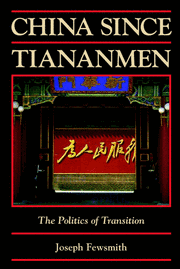Book contents
- Frontmatter
- Contents
- Acknowledgments
- Chronology
- Schematic Overview of Chinese Political Spectrum
- List of Abbreviations and Tables
- Introduction: State and Intellectuals at the Turn of the Century
- Part I Line Struggle Revisited: The Attack on Deng's Reform Program
- Part II Redefining Reform: The Search for a New Way
- Part III Elite Politics and Popular Nationalism
- 6 Jiang Zemin's Rise to Power
- 7 Elite Politics in an Era of Globalization and Nationalism
- Conclusion
- Epilogue
- Notes
- Bibliography
- Index
7 - Elite Politics in an Era of Globalization and Nationalism
Published online by Cambridge University Press: 05 September 2012
- Frontmatter
- Contents
- Acknowledgments
- Chronology
- Schematic Overview of Chinese Political Spectrum
- List of Abbreviations and Tables
- Introduction: State and Intellectuals at the Turn of the Century
- Part I Line Struggle Revisited: The Attack on Deng's Reform Program
- Part II Redefining Reform: The Search for a New Way
- Part III Elite Politics and Popular Nationalism
- 6 Jiang Zemin's Rise to Power
- 7 Elite Politics in an Era of Globalization and Nationalism
- Conclusion
- Epilogue
- Notes
- Bibliography
- Index
Summary
Between the Fourth Plenum in 1994 and the Fifteenth Party Congress in 1997, “public opinion” played a limited but not insignificant role. As discussed in Part II, the intellectual atmosphere became considerably more conservative and nationalistic in this period, which helped the government preserve the social stability that it prized so highly. Moreover, there was greater interaction between government and intellectual circles as each tried to influence the other (a trend that coexisted with its opposite, as some intellectuals oriented their activities toward society – ignoring the government – while others withdrew into scholarly endeavors or developed new critiques of government). We have seen how intellectuals such as Hu Angang and Wang Shaoguang influenced government policy, at least to some extent, on such issues as tax reform and regional disparities, and how the government tried to organize and solicit new, but acceptable, ideas through such books as Heart-to-Heart Talks with the General Secretary. We have also seen how the Old Left tried to influence both elite politics and public opinion through the various 10,000-character manifestos. There were also clear connections between elements of the elite and expressions of nationalistic opinion, whether through journals such as Strategy and Management or books such as China Can Say No.
These conflicting trends of elite and popular opinion reached a new level of intensity in 1997 as Jiang tried to put his imprint on the post-Deng era, only to face another powerful wave of nationalism that grew up around the issues of China's entry into the WTO and, more importantly, the tragic bombing of the Chinese Embassy in Belgrade.
- Type
- Chapter
- Information
- China since TiananmenThe Politics of Transition, pp. 190 - 220Publisher: Cambridge University PressPrint publication year: 2001



